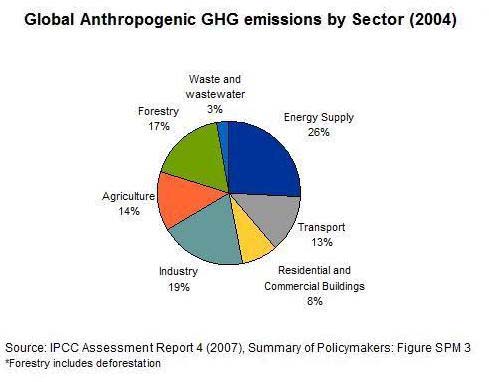In the last post I talked about the danger of biodiversity loss and I put up a video of Thomas Friedman talking about the importance of getting involved with responsible corporations to combat climate change. I’d like to expand on that a bit in this post.

According to the Pew Center on Global Climate Change, industry represents 19% of total international carbon emissions. That is a huge chunk of the pie. Because of the very large role corporations play in spewing greenhouse gases into the air, it is all the more important to get them to change. While switching the lightbulbs in your house to more efficient bulbs and driving less are very important changes that all of us need to make, the significant change will happen by cleaning up industry. The Wal-Marts, Exxon Mobiles, General Electrics, McDonalds, and Nestles of the world. If environmentalists, consumers, and governments can partner with some of the worst polluters in a cooperative effort, real change can take place. Many of these corporations have been responsible for polluting our air, dumping toxic waste into our rivers and streams, and destroying wildlife habitats across the world. They have been the evil villains for years, forever attracting the public’s outrage. Environmentalists saw industry as something that needed to be restrained, contained, and regulated. Industry saw the environment and environmentalists as pests; obstacles in the way of making money. The environment and industry were opposites. Being green and being profitable were mutually exclusive.
Why the change of heart? Money. The environment is beginning to be seen as a way of MAKING money, not an obstacle to it. Environmentalists are beginning to see that industry is not going away, and greening them can be positive for everyone. What’s more, many entrepreneurs are seeing the huge business opportunity in green industry. Solar panels, wind turbines, green efficiency, green design. That’s the future of business. Applying pressure to the worst violators is important, but what will really change behavior, what will really work, is the financial gain from going green. That’s the biggest motivator for corporations.

Lifetime oilman T. Boone Pickens bet his personal fortune on environmental business. Last year, he announced his “Pickens Plan,” which consisted of converting the nation’s auto fleet to run on natural gas, as a temporary solution (natural gas is much cleaner than regular gasoline), and meanwhile, he planned on building the world’s biggest wind farm in Texas. Far from being a treehugger, Pickens believes in the huge business opportunity in alternative energy, because of the dwindling supply of oil in the world.
Wal-Mart realized that by going green they could make more money. By making their trucks more efficient they could save millions in fuel costs; by using less plastic in packaging, they could save more; by using less energy to heat and cool their stores, they could save more; by selling environmentally-friendly products that their customers demand, they could sell more.  Wal-Mart now has solar panels on a few of its locations, they sell fair-trade coffee, they are buying wind energy to supply hundreds of its locations in Texas, and has donated $5.7 million to supporting green job creation in the US. There has been no shortage of public pressure and outrage directed at Wal-Mart for all of its sins. But if Wal-Mart can alter its carbon footprint, clean up their operations, huge progress can be made.
Wal-Mart now has solar panels on a few of its locations, they sell fair-trade coffee, they are buying wind energy to supply hundreds of its locations in Texas, and has donated $5.7 million to supporting green job creation in the US. There has been no shortage of public pressure and outrage directed at Wal-Mart for all of its sins. But if Wal-Mart can alter its carbon footprint, clean up their operations, huge progress can be made.
Clorox has introduced its environmentally-friendly cleaning products.
General Electric has bet big on wind and solar energy.
Even some oil companies have invested in alternative energy, seeing which way the winds of the future are blowing.
Industries have been the biggest pollutors for years. But shaming them out of business is not a productive way of combating climate change. As Thomas Friedman said, finding the responsible players in the corporate world, and partnering with them to bring about change, can have a huge impact. Industry represents 19% of total carbon emissions. If we can clean up that 19% and make money while we are at it, the world can be a better place.
